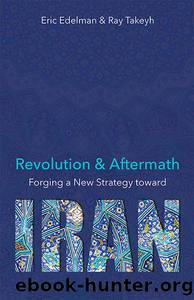Revolution & Aftermath: Forging a New Strategy Toward Iran by Eric Edelman & Ray Takeyh

Author:Eric Edelman & Ray Takeyh [Edelman, Eric & Takeyh, Ray]
Language: eng
Format: epub
Tags: International Relations, Middle East, Political Science, History, General
ISBN: 9780817921545
Google: rvJEuAEACAAJ
Goodreads: 40539595
Publisher: Hoover Institution Press
Published: 2018-01-15T13:27:00+00:00
OBAMAâS OUTREACH
Barack Obama came into office determined to engage the Islamic Republic. He campaigned as an opponent of âstupid warsâ and an advocate for unconditional outreach to American adversariesâincluding Iran. The new president stressed in his maiden foreign policy speech in Cairo that Iran had a âright to access peaceful nuclear energyâ and offered talks âwithout precondition.â14 The Bush administrationâs policy of not participating in the talks unless Tehran first suspended its program was forfeited. Iran obtained a critical concession from the United States without having done anything other than continue its nuclear activities at full tilt. The lesson to Tehran was clear: intransigence could be an effective negotiating technique. It would successfully apply that lesson over the eight years of the Obama administration. As it turned out, dropping the demand for suspension of enrichment was just the first of a cascade of concessions that the Obama White House would make to Iran. As a result, the final agreement that the P5+1 negotiated, the Joint Comprehensive Plan of Action, stands as the most deficient arms control agreement in American history.
Obama would prove to be the architect of his own Iran policy, if not his own unusual strategic doctrine. At its core, the Obama presidency was about propitiating US enemies who, in the mind of the president, had been wronged historically by the American imperium. In the Obama cosmology, Iranian clerics, Cuban communists, and Chinese chauvinists are all victims of centuries of American and Western abuse and exploitation. No agreement with them should demand reciprocity, since they are the disadvantaged parties and America is the superpower. In this view, diplomacy cannot be detached from the expiation of past wrongs.
As the Obama White House plotted its strategy, the Islamic Republic went through one of the most consequential political crises in its history. The presidential election of 2009 featured an array of lackluster candidates who seemed destined to be forgotten. For decades, Supreme Leader Ali Khamenei had consolidated his authority by vesting control of governing institutions in his young followers. Ahmadinejad was clearly Khameneiâs choice in the summer of 2009 and the muscle of the state was behind his reelection. Nonetheless, former prime minister Mir-Hossein Mousavi, who had been out of office since 1989, managed to capture the national imagination. His stinging critique of Ahmadinejadâs incompetence and bellicosity resonated with the public. By all appearances, Mousavi won the majority of votes on Election Day.
In an ominous break from tradition, moments after the polls closed, Iranâs official organs began declaring Ahmadinejad the victor by an impressive twenty-three-point margin. In a coordinated campaign, the media outlets quickly followed suit and celebrated the incumbentâs landslide. The morning after the election, Khamenei hailed the vote as a âdivine assessmentâ and warned the opposition against âprovocative behavior.â The regime must have thought that warnings and displays of power would overcome the crisis of a transparently contrived election result. Yet the guardians of the revolution badly miscalculated the mood of their citizenry. The ensuing street protests, the largest since
Download
This site does not store any files on its server. We only index and link to content provided by other sites. Please contact the content providers to delete copyright contents if any and email us, we'll remove relevant links or contents immediately.
| Bahrain | Egypt |
| Iran | Iraq |
| Israel & Palestine | Jordan |
| Kuwait | Lebanon |
| Oman | Qatar |
| Saudi Arabia | Syria |
| Turkey | United Arab Emirates |
| Yemen |
Empire of the Sikhs by Patwant Singh(23069)
The Wind in My Hair by Masih Alinejad(5085)
Rise and Kill First by Ronen Bergman(4776)
The Templars by Dan Jones(4681)
The Rape of Nanking by Iris Chang(4201)
12 Strong by Doug Stanton(3541)
Blood and Sand by Alex Von Tunzelmann(3193)
Babylon's Ark by Lawrence Anthony(2671)
The History of Jihad: From Muhammad to ISIS by Spencer Robert(2618)
No Room for Small Dreams by Shimon Peres(2362)
The Turkish Psychedelic Explosion by Daniel Spicer(2352)
Inside the Middle East by Avi Melamed(2349)
Gideon's Spies: The Secret History of the Mossad by Gordon Thomas(2337)
Arabs by Eugene Rogan(2292)
The First Muslim The Story of Muhammad by Lesley Hazleton(2263)
Come, Tell Me How You Live by Mallowan Agatha Christie(2246)
Bus on Jaffa Road by Mike Kelly(2150)
1453 by Roger Crowley(2022)
Kabul 1841-42: Battle Story by Edmund Yorke(2020)
